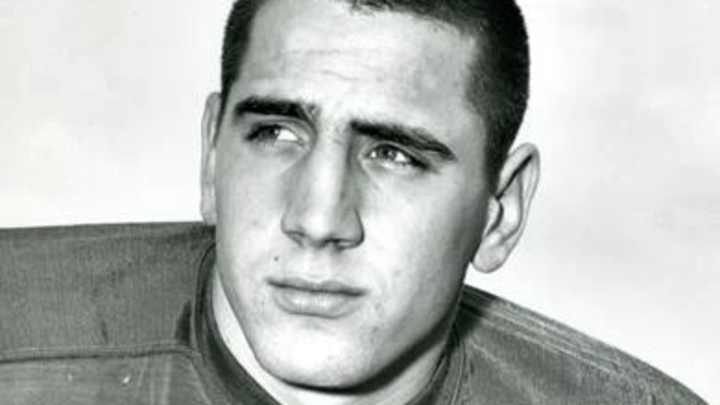1966 Alabama Football Team Captain, All-American Richard Cole Dies

Former All-American and team captain Richard Cole, who was part of the 1964 and 1965 national champions, and the undefeated 1966 Crimson Tide, has died.
The cause of death had not been disclosed, but the retired educator had been having some health issues.
From Crossville, Ala., Cole played on teams that were 30-2-1 and won two national championships.
He had eight tackles and keyed the pressure attack on Auburn in the 1965 game when the Tide intercepted seven passes. He also had six solo tackles in the Tide’s 31-7 win over LSU in 1965.
He was named an All-American in 1966.
When the undefeated team held its 50th reunion weekend on campus in 2016, Cole was was still representing his teammates. He and Ray Perkins had served as the team co-captains.
“I really enjoy that,” Cole said about seeing everyone again as many of the players remained tight over the years.
“Of course, we’re getting older, and that makes it a little bit different.”
To him, the friendships stood out a lot more than the controversial national championship snubbing.
“We don’t talk about it much,” Cole said.
“We all know it should be a national championship reunion. We were deprived of that, and I still haven’t forgotten that.”
History hasn’t either as Alabama was in the midst of Coach Paul W. “Bear” Bryant’s first dynasty with the Crimson Tide, having won the 1961 national title, plus back-to-back championships in 1964-65. The two-time reigning national champion had gone 10-1 in 1964, and 9-1-1 the following year, in both cases taking advantage of when the voting for the final Associated Press Poll was held.
After Alabama lost a controversial 21-17 game to Texas in the Orange Bowl at the end of the 1964 season, the AP moved its final voting from before bowl games to after. Then in 1965, Alabama was ranked No. 4 at the end of the regular season when Bryant turned down an invitation to play in the Cotton Bowl to face No. 3 Nebraska in the Orange Bowl. His thinking was if No. 1 Michigan State lost to UCLA in the Rose Bowl and No. 2 Arkansas was defeated by LSU in the Sugar Bowl, the Orange Bowl would determine the national champion.
That’s exactly what happened.
All the pieces were in place for another monster season in 1966, with Kenny Stabler at quarterback and an imposing defense that fully embraced the Bryant credo that you can’t lose if you don’t give up any points, the Crimson Tide shut out six opponents, including the last four teams it faced in the regular season.
Cole, offensive tackle Cecil Dowdy, defensive back Bobby Johns and Perkins were all named All-Americans, with guard John Calvert and back Dicky Thompson earning all-conference honors as well, and end Wayne Cook and tackler Jerry Duncan tabbed second-team All-SEC.
Sure enough, after being named No. 1 in the preseason Associated Press Poll the Crimson Tide ran the table, going a perfect 10-0. However, it was just No. 3 when it faced No. 6 Nebraska in the Sugar Bowl for a rematch of the previous year’s decisive title game.
Yes, No. 3.
Here’s how it played out: With an usual bye on Week 1, Alabama slipped down two slots before having even playing a game, with Michigan State moving to the top slot after a decisive home win over North Carolina State in its opener. A month later Notre Dame jumped ahead of the Spartans after thumping No. 10 Oklahoma, 38-0, and the hype started building toward their No. 1 vs. No. 2 showdown scheduled for Nov. 19.
It was called the “Game of the Century,” but did not live up to that moniker due to the way that it ended. In one of the most controversial moves in college football history, Notre Dame coach Ara Parseghian opted to run out the clock during the final minutes, taking a 10-10 tie instead of going for the win.
After defeating No. 10 USC a week later, 51-0, Notre Dame was rewarded with the No. 1 ranking, while Michigan State’s season was already over. Both teams were 9-0-1, but the Fighting Irish had a standing policy of not playing in bowl games because they interfered with academics (at the time, the first semester ended in late January), and the Big Ten had a rule preventing its schools from playing in consecutive Rose Bowls.
Meanwhile, Alabama destroyed every team it faced minus one, Tennessee, which it still came back to defeat in the Knoxville rain, 11-10. That actually caused it to drop to No. 4 in the subsequent poll, but the Crimson Tide kept churning out wins, each one arguably more impressive than the last.
After the “Tie of the Century,” as some called it, UA closed out the regular season with a 31-0 victory in the Iron Bowl to finish the regular season as the only team in Division I-A with a perfect record.
Even the Orange Bowl was a complete Crimson Tide affair. With Stabler throwing a 45-yard pass to Perkins on the first play from scrimmage to set up the first score, and Johns making three interceptions, Alabama crushed Nebraska in a 34-7 rout.
Yet instead of winning a third straight title, an accomplishment that has yet to be done during the modern era of college football, Alabama stayed at No. 3.
Bryant was quoted as saying, “At Alabama, we teach our men to win,” and numerous ranking services, including the National Championship Foundation and Clyde Berryman’s Quality Point Rating System had the 11-0 Tide No. 1, but Alabama doesn’t claim it. Fans would later refer to it as the one that got away or the what author Keith Dunnavant titled his 2006 book on the subject: “The Missing Ring.”
Many believe that the state’s racial issues, which were the focal point of the national debate, including Governor George Wallace’s “Stand in the Schoolhouse Door,” the Rosa Parks bus incident in Montgomery, and the Selma civil rights march, were a crucial factor in the snubbing. Additionally, the Crimson Tide had yet to integrate the football team, with Bryant publicly saying the time wasn’t right yet while helping some standout black athletes land at other top programs, including, ironically, Michigan State and his friend Duffy Daugherty.
But none of that had anything to do with the players on the ’66 team, who are still left wondering “What if?”
“If Notre Dame would have agreed to have played us in a bowl game, it would have been established if we were the best or if they were the best,” Cole said. “I always felt like, and Coach Bryant did too, when they opted not to play us that it should have given us a nod over them. The voting didn’t turn out that way.
“It’s still frustrating. It always will be.”
This story will be updated as more information becomes available.
